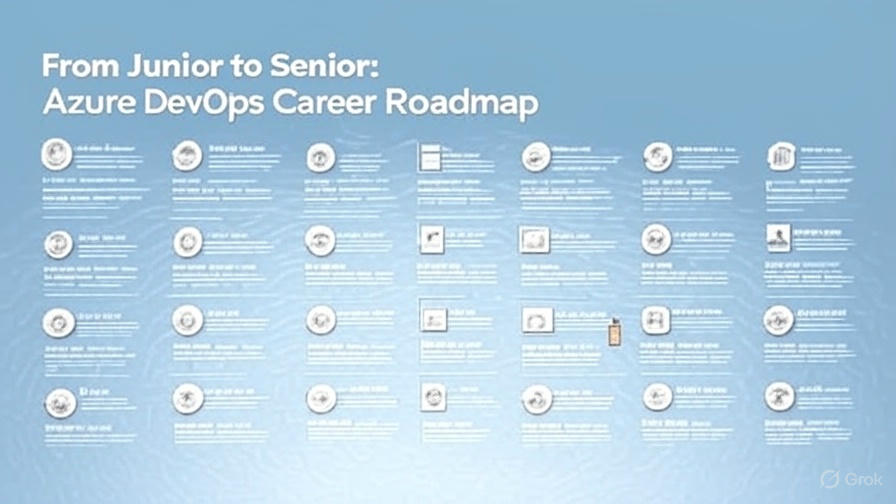
From Junior to Senior: Azure DevOps Career Roadmap
From Junior to Senior: Azure DevOps Career Roadmap
Embarking on a career in Azure DevOps can be both exciting and challenging. Whether you’re just starting out or looking to advance to a senior position, understanding the Azure DevOps career roadmap is crucial. This guide will walk you through the essential steps, skills, and experiences needed to transition from a junior to a senior role in Azure DevOps.
For those new to the field, beginning with azure devops engineer training can provide a solid foundation. Additionally, gaining a broad understanding through microsoft azure fundamentals online training free can be incredibly beneficial.
Understanding the Basics
What is Azure DevOps?
Azure DevOps is a set of development tools and services provided by Microsoft. It offers an end-to-end DevOps toolchain for developing and deploying software. It also integrates with most leading tools on the market and is a great option for orchestrating a DevOps toolchain.
Key Components of Azure DevOps
Azure DevOps comprises several key components:
- Azure Boards: For work tracking with Kanban boards, backlogs, team dashboards, and custom reporting.
- Azure Pipelines: For continuous integration and continuous delivery (CI/CD) to build, test, and deploy code.
- Azure Repos: For source control with unlimited cloud-hosted private Git repos.
- Azure Test Plans: For manual and exploratory testing.
- Azure Artifacts: For creating, hosting, and sharing packages.
Starting as a Junior Azure DevOps Engineer
Educational Background and Certifications
A strong educational background in computer science, information technology, or a related field is essential. Certifications can also play a significant role in validating your skills and knowledge.
- Microsoft Certified: Azure Fundamentals: This certification is a great starting point for anyone new to Azure.
- Microsoft Certified: Azure DevOps Engineer Expert: This certification is more advanced and demonstrates your expertise in Azure DevOps.
Essential Skills for Junior Azure DevOps Engineers
As a junior Azure DevOps engineer, you should focus on developing the following skills:
- Version Control: Proficiency in Git and understanding of branching strategies.
- CI/CD Pipelines: Knowledge of creating and managing CI/CD pipelines using Azure Pipelines.
- Scripting: Basic scripting skills in PowerShell, Bash, or Python.
- Infrastructure as Code (IaC): Understanding of IaC tools like ARM templates, Terraform, or Ansible.
- Collaboration Tools: Familiarity with collaboration tools like Azure Boards and Microsoft Teams.
Gaining Experience and Advancing Your Career
Hands-On Experience
Gaining hands-on experience is crucial for advancing your career. Work on real-world projects, contribute to open-source projects, and participate in hackathons. This practical experience will help you understand the challenges and best practices in Azure DevOps.
Continuous Learning and Professional Development
The field of DevOps is constantly evolving, and staying up-to-date with the latest trends and technologies is essential. Attend webinars, workshops, and conferences. Join professional organizations and online communities to network with other professionals and learn from their experiences.
Mentorship and Networking
Finding a mentor who is an experienced Azure DevOps professional can provide valuable guidance and support. Networking with other professionals in the field can also open up new opportunities and help you stay informed about industry trends.
Transitioning to a Senior Azure DevOps Engineer
Advanced Skills and Knowledge
As you progress in your career, you’ll need to develop advanced skills and knowledge in Azure DevOps. This includes:
- Advanced CI/CD Pipelines: Creating complex CI/CD pipelines with multiple stages and environments.
- Security and Compliance: Understanding security and compliance requirements and implementing best practices.
- Monitoring and Logging: Setting up monitoring and logging solutions to track the performance and health of your applications.
- Scalability and Performance: Designing and implementing scalable and high-performance solutions.
Leadership and Management Skills
Transitioning to a senior role also requires developing leadership and management skills. This includes:
- Team Management: Leading and managing a team of DevOps engineers.
- Project Management: Managing projects, setting priorities, and ensuring timely delivery.
- Communication: Effectively communicating with stakeholders, including developers, operations teams, and business leaders.
- Strategic Planning: Developing and implementing strategic plans to achieve business goals.
Overcoming Challenges and Achieving Success
Common Challenges in Azure DevOps
Working in Azure DevOps can present several challenges, including:
- Complexity: Managing complex environments and pipelines can be challenging.
- Security: Ensuring the security and compliance of your applications and infrastructure.
- Collaboration: Effectively collaborating with different teams and stakeholders.
- Continuous Learning: Keeping up with the latest trends and technologies in the field.
Strategies for Success
To overcome these challenges and achieve success in your Azure DevOps career, consider the following strategies:
- Continuous Improvement: Always look for ways to improve your skills and knowledge.
- Collaboration: Foster a collaborative environment and work closely with other teams.
- Innovation: Be open to new ideas and technologies, and don’t be afraid to experiment.
- Resilience: Stay resilient and persistent in the face of challenges and setbacks.
Conclusion
Transitioning from a junior to a senior role in Azure DevOps requires a combination of education, experience, and continuous learning. By developing the essential skills, gaining hands-on experience, and staying up-to-date with the latest trends and technologies, you can successfully navigate the Azure DevOps career roadmap and achieve your career goals.
What are the key components of Azure DevOps?
Azure DevOps comprises several key components, including Azure Boards for work tracking, Azure Pipelines for CI/CD, Azure Repos for source control, Azure Test Plans for testing, and Azure Artifacts for package management.
What certifications are essential for a junior Azure DevOps engineer?
Essential certifications for a junior Azure DevOps engineer include Microsoft Certified: Azure Fundamentals and Microsoft Certified: Azure DevOps Engineer Expert.
What skills are crucial for advancing in an Azure DevOps career?
Crucial skills for advancing in an Azure DevOps career include proficiency in version control, CI/CD pipelines, scripting, infrastructure as code (IaC), and collaboration tools.
How can I gain hands-on experience in Azure DevOps?
You can gain hands-on experience in Azure DevOps by working on real-world projects, contributing to open-source projects, and participating in hackathons.
What are the common challenges in Azure DevOps?
Common challenges in Azure DevOps include managing complex environments and pipelines, ensuring security and compliance, effectively collaborating with different teams, and keeping up with the latest trends and technologies.
What strategies can help achieve success in an Azure DevOps career?
Strategies for success in an Azure DevOps career include continuous improvement, fostering a collaborative environment, being open to new ideas and technologies, and staying resilient and persistent in the face of challenges.
What is the role of a senior Azure DevOps engineer?
The role of a senior Azure DevOps engineer includes leading and managing a team, managing projects, effectively communicating with stakeholders, and developing and implementing strategic plans to achieve business goals.
How important is continuous learning in an Azure DevOps career?
Continuous learning is crucial in an Azure DevOps career as the field is constantly evolving. Staying up-to-date with the latest trends and technologies is essential for success.
What leadership skills are required for a senior Azure DevOps engineer?
Leadership skills required for a senior Azure DevOps engineer include team management, project management, effective communication, and strategic planning.
How can mentorship and networking benefit an Azure DevOps career?
Mentorship and networking can provide valuable guidance and support, open up new opportunities, and help you stay informed about industry trends in an Azure DevOps career.


